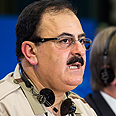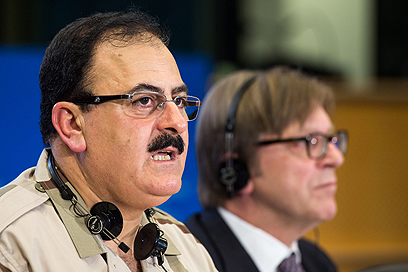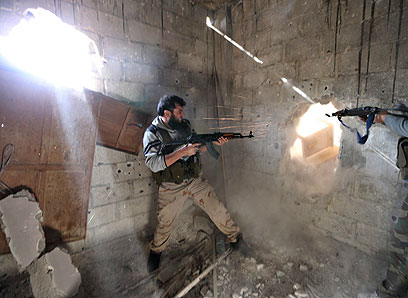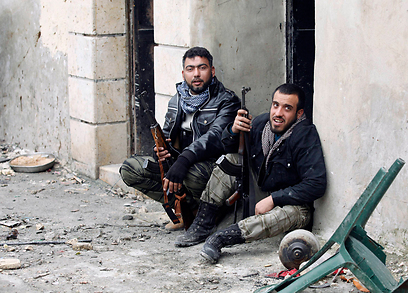
Syrian rebels defect in droves
Western-backed Syrian rebel opposition coalition crumbling after leader’s controversial remarks spark mutiny, disorder among soldiers, commanders, thus potentially threatening Syrian peace confrence
Salim Idriss is a former Syrian army officer who defected to join the Free Syrian Army and lead Syrian Military Council, the military arm of the Syrian National Coalition (SNC), the western-backed political opposition to the government of Syrian President Bashar Assad.
Related stories:
- Peace talks scheduled as rebels advance on Damascus
- Syrian TV: Army kills leader of rebel group Jabhat al-Nusra
- Syrian opposition alleges new poison gas attack
The initial statements were made in an intelligence report authored by the SMC to the United States State Department.

Gen. Salim Idris (Photo: AP)
Idriss outlined the key threats to rebel fighters and focused heavily on The Islamic State of Iraq and the Levant (ISIL) group and the large number of foreign jihadist al-Qaeda inspired fighters within Syria. He suggested the number of foreign fighters was in excess of 5,000 and that they “are constantly fitted with explosive vests and threaten all who dare to confront them.”
He made further comments in a Washington Post interview, saying, “If Bashar Assad leaves power and we have a transitional government under the control of the opposition, and the ISIS refuses to leave the country, it is very important for all Syrians to fight against them.”
He went on to say, “When Bashar Assad leaves power, the army will not be the regime army, but the army of the people. The army must continue fighting ISIS.”

Fighting in Damascus (Photo: Reuters)
The remarks were reported in the British press as implying that the Free Syrian Army would fight alongside Assad against ISIS and other extremist groups.
In a statement obtained by The Media Line Idriss said he was misquoted and that the suggestions were a “lie and a fabrication.”
Islamist groups decried the comments as a sign that Idriss was not comfortable with their ideology. On Wednesday, Jahran Alloush, leader of the rebel group Jaish Al-Islam and a member of the Islamic Front, withdrew his support from both the Syrian Military Council and Idriss in a public statement.
Last month, the Islamic front, known as Jabhat Al-Islamiyya and comprising some of the largest and most powerful moderate Islamist groups in Syria, officially left the Syrian Military Council. This defection removed a majority of the Council's on-the-ground support base. Their negotiating position was therefore drastically weakened.

Rebels in Aleppo (Photo: Reuters)
In a further blow to the western-backed rebel coalition, Saddam Al-Jamal, the former leader of the Free Syrian Army’s Eastern Front, recently defected from both the Syrian Military Council and the Free Syrian Army and pledged allegiance to the Islamic State of Iraq and the Levant (ISIL), the largest Islamist opposition force in Syria. He had previously been aligned with the Ahfad Al-Rasoul group, which had a long history of problems with ISIL.
After defecting, Al-Jamal released a damning video about the Syrian Military Council and the Syrian National Coalition, which stated that the groups are closely aligned with western intelligence organizations and that they had a plan to fight against ISIS and other extreme groups. According to a translation on the Brown Moses blog, he went on to say that the west was not prepared to arm groups within Syria, even through the Free Syrian Army.
“They will not give it to any faction inside Syria. They want to receive 25-50 fighters and train them abroad,” he said, suggesting the weapons would only be given to small groups of elite fighters trained by the United States outside of Syria in neighbouring countries.
The spate of defections and obvious lack of influence held by the Syrian Military Council within rebel groups inside Syria begs the question of the usefulness of the Geneva II peace talks, scheduled for Jan. 22. With nobody representing the groups on the ground, any talk of a transitional government or ceasefire represents only the now-toothless Syrian National Coalition.
The only optimistic voice about Idriss and the Syrian political opposition came from the spokesperson for the US State Department, who said on Monday, “We are still working very closely with General Idriss, we're still working towards a Geneva conference in January, and we still believe there's no military solution.”
Article written by Emma Beals
Reprinted with permission from The Media Line
- Receive Ynetnews updates directly to your desktop










